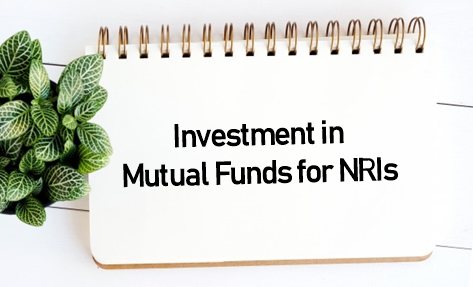
Table of Contents
- Benefits of Mutual Funds for NRIs
- Understanding FEMA and Investment Rules
- How Can NRIs Invest in Mutual Funds: Step-by-Step Guide
- Mutual Fund Investment Options for NRIs
- Continuing with Existing SIPs for NRIs
- Top 11 SIP Mutual Funds in India FY 25 - 26
- Required Documentation for NRIs
- Repatriation of Funds for NRIs
- The Power of Compounding: Unlocking Long-Term Growth
- Maximising the Power of Compounding
- Maximising the Power of Compounding
- Taxation of NRI Investments in Mutual Funds
- Taxation of Capital Gains
- Tax Deducted at Source (TDS)
- Double Taxation Avoidance Agreement (DTAA)
- Taxation of Systematic Investment Plans (SIPs)
- Tax on Systematic Withdrawal Plans (SWPs)
- Key Tax Rates for NRIs in Mutual Fund Investments
- Wrapping Up
Mutual Funds for NRIs: A Guide to Investing from Overseas
Mutual Funds have gained popularity due to their flexibility, diversification, and potential for substantial returns.

But what about NRIs—can they invest in Indian mutual funds? The answer is yes, but they must follow specific rules and tax regulations. Here's a guide for NRIs looking to invest in Mutual Funds in India.
Benefits of Mutual Funds for NRIs
Investing in Indian mutual funds allows NRIs to tap into India's Economic Growth. With a wide array of schemes—equity, debt, and hybrid—NRIs can choose funds based on their risk appetite. Some of the top-performing mutual funds for NRIs in 2024 offer robust returns, making it a solid option for diversifying investments.
Understanding FEMA and Investment Rules
NRIs need to comply with the Foreign Exchange Management Act (FEMA) regulations when investing in Indian mutual funds. FEMA rules ensure that NRI investments are legal and compliant with Indian laws. Understanding these rules is critical to avoid any regulatory issues.
How Can NRIs Invest in Mutual Funds: Step-by-Step Guide
Step 1: Set Up an Account
NRIs cannot invest in Indian mutual funds using foreign currency, so they must open specific Indian Bank accounts. There are two main options:
- NRE (Non-Resident External) Account: Ideal for sending overseas Income to India, Offering easy repatriation of both principal and interest.
- NRO (Non-Resident Ordinary) Account: Used to manage income generated within India, though repatriation is more limited.
The choice between an NRE and NRO account depends on whether you want the ability to repatriate funds. Once the account is set up, NRIs can invest in mutual funds either through:
Self or Direct Investments: NRIs can invest directly via Indian banking channels, with the application specifying whether the investment is repatriable or non-repatriable. Documents needed include:
- PAN card
- Passport
- Proof of overseas residence
- Recent photograph
Additionally, an in-person verification may be required, which can be done at an Indian Embassy.
- Power of Attorney (PoA): NRIs can assign someone in India to manage investments on their behalf. In this case, both the NRI and the PoA holder need to sign the KYC documents.
Talk to our investment specialist
Step 2: Complete KYC
NRIs must complete the Know Your Customer (KYC) process before investing. The following documents are required:
- Passport copy (including relevant pages)
- Date of birth, photograph, and address proof
- Residential proof (permanent or temporary)
Note: Due to the Foreign Account Tax Compliance Act (FATCA), some Indian Mutual Fund Houses restrict investments from NRIs residing in the USA and Canada. However, many funds allow these investments with additional documentation.
Step 3: How to Redeem Mutual Funds for NRIs
When NRIs redeem their mutual fund investments, the corpus (investment + gains) is credited to their NRE or NRO account after deducting applicable Taxes. Alternatively, some fund houses may issue a cheque for the redemption amount. Since redemption processes can vary between fund houses, it’s essential to check specific procedures beforehand to ensure a smooth transaction.
Mutual Fund Investment Options for NRIs
NRIs have various options to choose from when investing in mutual funds. Some common schemes include:
- Equity Funds: Focused on stock market investments, offering higher growth potential but with more risk.
- Debt fund: Invest in fixed-income securities like Bonds and are generally less volatile.
- Hybrid Fund: A mix of equity and debt, balancing growth and stability.
NRIs can invest in these funds online or through a Power of Attorney (PoA) in India.
Continuing with Existing SIPs for NRIs
If you’ve already initiated a Systematic Investment plan (SIP) as a resident Indian, you can continue it even after becoming an NRI. However, you must update your bank details with the AMC (Asset Management Company) or broker to reflect your NRO account.
Should you decide to redeem your mutual fund investments (including SIPs) made as a resident, the redemption amount will be credited to your NRO account after deducting Tax Deducted at Source (TDS).
Top 11 SIP Mutual Funds in India FY 25 - 26
Fund NAV Net Assets (Cr) Min SIP Investment 3 MO (%) 6 MO (%) 1 YR (%) 3 YR (%) 5 YR (%) 2023 (%) ICICI Prudential Infrastructure Fund Growth ₹182.77
↑ 0.55 ₹7,214 100 2.6 -3.8 7.1 28.1 38.9 27.4 IDFC Infrastructure Fund Growth ₹48.045
↑ 0.19 ₹1,563 100 0.9 -6.6 5.3 25.9 36.1 39.3 L&T Emerging Businesses Fund Growth ₹75.9538
↑ 0.35 ₹13,334 500 -5.3 -12.2 3.3 18.4 35.7 28.5 Nippon India Power and Infra Fund Growth ₹329.752
↑ 2.52 ₹6,849 100 1.3 -6 2.9 28.2 35.7 26.9 HDFC Infrastructure Fund Growth ₹45.192
↑ 0.06 ₹2,329 300 3 -4.2 4.3 28.5 35.2 23 Franklin Build India Fund Growth ₹134.325
↑ 1.09 ₹2,642 500 2.6 -4.1 6.2 27.9 35.1 27.8 DSP BlackRock India T.I.G.E.R Fund Growth ₹293.535
↑ 0.97 ₹4,880 500 -0.9 -10.4 3.5 25.6 34.6 32.4 Franklin India Smaller Companies Fund Growth ₹161.744
↑ 0.73 ₹11,970 500 -2.2 -8.3 3.2 21.5 34.5 23.2 Kotak Small Cap Fund Growth ₹244.695
↑ 0.54 ₹15,706 1,000 -4.2 -11 6.9 14.1 33.7 25.5 Edelweiss Mid Cap Fund Growth ₹94.124
↑ 0.62 ₹8,634 500 0 -4.1 18.8 23.3 33.6 38.9 IDFC Sterling Value Fund Growth ₹142.927
↑ 0.69 ₹9,430 100 2.7 -4.4 6.8 16.4 33.5 18 Note: Returns up to 1 year are on absolute basis & more than 1 year are on CAGR basis. as on 23 Apr 25 200 Crore in Equity Category of mutual funds ordered based on 5 year calendar year returns.
Required Documentation for NRIs
To invest or continue investing in mutual funds as an NRI, you’ll need to provide the following documents:
- Passport (with relevant pages)
- KYC Form
- Proof of NRI Status, such as a Visa, Work Permit, Residence Permit (for Indian passport holders), or OCI card (for overseas passport holders)
- Proof of Address, like a Driving License, Voter ID, Aadhaar, or Passport
- Copy of Passport, Visa, and Contract Letter for seafarers
- FATCA/CRS Declaration (for US, UK, Canada, or other participating countries)
All documents must be self-certified. Additionally, in-person verification may be required, which can be done physically or through a PoA.
Repatriation of Funds for NRIs
NRIs can choose to invest on a repatriable or non-repatriable Basis:
- NRE Account: Proceeds from mutual fund investments are fully repatriable.
- NRO Account: Proceeds are repatriable up to USD 1 million annually across all NRO accounts in India, per financial year (April–March).
The Power of Compounding: Unlocking Long-Term Growth
Compounding is a powerful force that can significantly enhance your returns over time. By reinvesting Earnings, your investments generate returns on both the initial amount and the accumulated interest, leading to exponential growth.
How Compounding Works:
Here’s an example to illustrate the potential of compounding. Let’s say you invest ₹10,000 monthly in an SIP with an average annual return of 12%:
- After 5 years: Your ₹6,00,000 investment grows to ₹8,00,035.
- After 10 years: Your ₹12,00,000 investment grows to ₹24,78,139.
- After 20 years: Your ₹24,00,000 investment becomes ₹75,54,855.
- After 30 years: Your ₹36,00,000 investment becomes a staggering ₹2,44,17,856.
Maximising the Power of Compounding
To fully harness the Power of Compounding, follow these strategies:
- Start Early: The earlier you start, the longer your money has to grow.
- Stay Invested Long-Term: Frequent withdrawals or adjustments hinder the benefits of compounding. Long-term investment is key.
- Reinvest Dividends: Instead of withdrawing dividends, reinvest them to accelerate the compounding effect on your returns.
By understanding and leveraging the power of compounding, NRIs can maximize their investment growth and achieve their Financial goals over time.
Maximising the Power of Compounding
To fully harness the power of compounding, follow these strategies:
- Start Early: The earlier you start, the longer your money has to grow.
- Stay Invested Long-Term: Frequent withdrawals or adjustments hinder the benefits of compounding. Long-term investment is key.
- Reinvest Dividends: Instead of withdrawing dividends, reinvest them to accelerate the compounding effect on your returns.
By understanding and leveraging the power of compounding, NRIs can maximize their investment growth and achieve their financial goals over time.
Taxation of NRI Investments in Mutual Funds
Understanding the taxation rules for NRI investments in mutual funds is essential for optimizing your returns. Tax-saving mutual funds offer a way to grow wealth while minimizing tax liabilities. Below is a comprehensive guide to NRI Mutual Fund Taxation, covering Capital gains, TDS, and how to navigate the rules to make the most of your investments.
Taxation of Capital Gains
Equity Mutual Funds
Short-Term Capital Gains (STCG): If you sell equity mutual fund units within 1 year, the gains are taxed at a flat rate of 15%.
Long-Term Capital Gains (LTCG): For holding periods of 1 year or more, LTCG exceeding ₹1 lakh within a financial year is taxed at 10% without indexation benefits.
Debt Mutual Funds
Short-Term Capital Gains (STCG): Gains from units held for less than 3 years are taxed according to your applicable income tax slab.
Long-Term Capital Gains (LTCG): Gains from units held for 3 years or more are taxed at 20% with indexation benefits.
Dividend Distribution Tax (DDT)
Equity Mutual Funds: A DDT of 10% applies to dividend income, and the dividend is tax-free in the hands of the investor.
Debt Mutual Funds: DDT is 25% (plus surcharge and cess), and the dividend remains tax-free for the investor.
Tax Deducted at Source (TDS)
For NRIs, TDS applies to capital gains:
- 15% on STCG from equity funds.
- 10% on LTCG from equity funds exceeding ₹1 lakh.
For debt funds, TDS is based on your income tax slab rates. Ensure that your AMC or broker deducts TDS correctly when you redeem investments.
Double Taxation Avoidance Agreement (DTAA)
India has signed DTAAs with various countries to prevent double taxation. As an NRI, you can claim tax relief or credit in your home country for taxes paid in India, according to the provisions of the DTAA. This helps you avoid paying taxes twice on the same income.
Taxation of Systematic Investment Plans (SIPs)
Each SIP installment is treated as a separate investment, and the holding period of each installment determines the applicable tax on capital gains:
- Short-term gains (if held for less than 1 year for equity, or less than 3 years for debt).
- Long-term gains (if held for more than 1 year for equity, or more than 3 years for debt).
Tax on Systematic Withdrawal Plans (SWPs)
Similar to SIPs, withdrawals under SWPs are taxed based on capital gains tax rules applicable at the time of redemption, which depend on the mutual fund type and the holding period.
Key Tax Rates for NRIs in Mutual Fund Investments
- STCG on Equity Funds: 15%
- LTCG on Equity Funds: 10% for gains exceeding ₹1 lakh
- STCG on Debt Funds: Based on income tax slab
- LTCG on Debt Funds: 20% with indexation
Wrapping Up
Investing in mutual funds provides NRIs with an excellent opportunity to benefit from India’s growing Economy while managing investments efficiently from abroad. Understanding the taxation rules, such as capital gains, TDS, and DDT, ensures you can make informed decisions. By following the right strategies and complying with the necessary regulations, NRIs can optimize their portfolio for long-term wealth creation in India. Always consult a tax professional to stay updated on tax laws and make the most of your mutual fund investments as an NRI.
All efforts have been made to ensure the information provided here is accurate. However, no guarantees are made regarding correctness of data. Please verify with scheme information document before making any investment.











